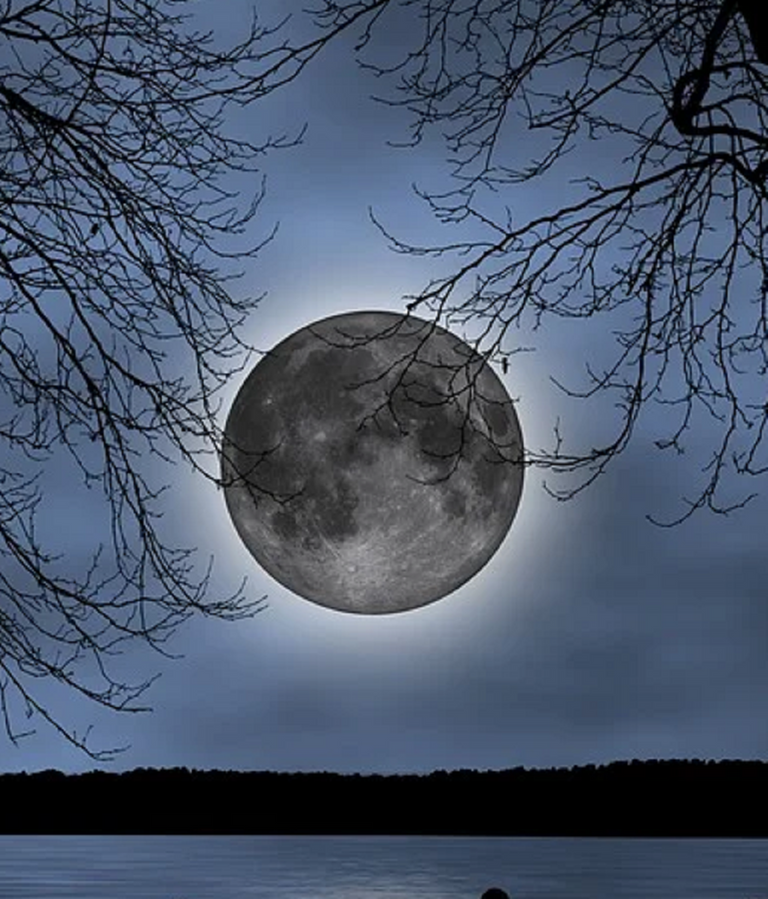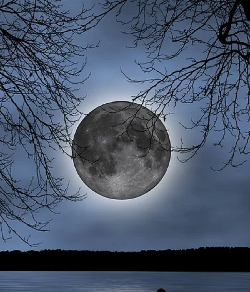Madly in love with the moon

Madly in love with the moon
Over the sinuous edges of the dark mountains, against a sky in indigo degradations, the moon is peeking out. The villagers arrive from the wheat fields. They can observe, raising their foreheads, the spectacle of that roundel ascending in the sky, as if it were moved by the will of a magnificent magician.
The population of the hamlet slows down at the sight of it. Resplendent in the contrast of the dark blue and ebony of the mountains, which serve as an initial frame at the entrance to the village. It is a full moon.
"It's Juan's moon," people say.
Juan has a long, slender figure, unmistakable to the villagers. The peasants know that he spends his time scribbling, on endless white pages, sketches of the moon. They know he is their admirer and their lover. Here he comes... fastening the buttons of his white shirt. His face is that of a groom walking down the aisle.
"Where are you going, Juan?" the children shout to him as he passes and he with circumspect seriousness replies:
"I'm going to meet my moon."
And where will you find her? the kids ask, even as they hear the same answers month after month.
"I'll find her in the well, or on the hill, or I'll find her perched in a tree, smiling, she may also be tangling her white gown among the dried bouquets. Today she wears a bride's dress, today, she and I will be married.
And what will you tell him?
Juan puts his hand on his heart and recites:
"I place in you my gaze/ You will be the light of my pupil/ My white love/ The one who finds me always."
Juan has declared his love to the moon for fifty years.
The history of the town tells that he was a good student who began to read about the immense number of poets who dedicated their lyrics to the moon. It was the time when armed men enlisted the boys for war.
Juan was not interested in uniforms, nor in offers of riches. Nor was he interested in working in the fields. He only wanted to continue reading, writing and drawing.
One January afternoon, by decree of the State, he was unlucky enough to be recruited as an aspiring soldier. The tearful parents of that village in the mountains watched their boys walk in single file to an unknown destination.
After two weeks he returned to the village. Eventually it was learned that the military insisted on asking him what job, or task, he was good at. At the harsh insistence, the boy only answered, in a litany and with his eyes filled with tears, that he was only good for writing poems to the moon.
Juan was released three days away from his village. He made his way back on foot, under the blue light of the second full moon of January. His figure as a child was silhouetted against the immense sphere that guarded him all the way home.
That was the image that the inhabitants of the simple village saw and that is how his fellow villagers began to relate to him. Since then -he was thirteen years old- Juan was considered the son of the whole village.
It seemed natural to everyone that it was good for him to start the habit of going out on the nearby roads, with his books and notebooks under his arm, when the moon lit up the nights.
They also understood his nostalgia and his silent crying during the nights of the new moon when the satellite, like a capricious woman, disappeared from the skies.
During the nights of that period, Juan remains alone in the square, under a lantern, with his sad gaze fixed on the sky, while he recites infinite verses:
On the body of the moon
no one puts its warmth.
Face to face sun and moon
between the moon and the sun
who seek each other and do not find each other
you and I.
But at last they will find each other,
we will find each other, love,
and the world will be round
towards our heart.
Thanks for reading

gracielaacevedo
The last three stanzas belong to the poem Sobre el cuerpo de la luna (On the body of the moon) by the Spanish poet Miguel Hernández.
Well, they do call it luna...
They call it the moon and all those who are passionate about it - like our Juan, a man who lost his sense of reality, paralyzed in a moment of trauma - are called crazy, lunatics.
Thanks so much for the wonderful story of a boy's love of the moon, and literature. May his works be known far and wide!
I loved this :) ... His poetry and love for the moon saved his life most likely!
Thank you, @wrestlingdesires! It's true. They saved his life and forever took away his sanity. Gotta watch out for the moon!
Still, he seemed happy :) ...
That's right. There is no greater happiness than knowing that love will find you.
Not even the military could separate him from his love and passion.
Wonderful story!
Thank you, @yaziris! In the face of fear a "normal" feeling turned into obsession. It can happen.
Wonderful tale and resplendent prose that evokes magical images and events. An inspired tale!
Es un cuento inspirado en los noctámbulos del mundo, los que encuentran en la luna el punto focal para la expresión de la belleza (una de las formas de la locura). GRacias por leer y por el bonito comentario, @litguru.
El amor es una locura y lujuria hermosa, y la luna es su mensajero errante.
The supreme cult of the moon when it can represent the premium beauty of all beauty. I also have my own "luna". Her name is Husna. And he represents all the beauty of God. I'm crazy about him too.
What a cute thing, @mosin-nagant!
What would poets be without the moon?
Oh, thanks @gracielaacevedo. Yes, and what would the moon be without a lover... ☺️.
Being in love saved him @gracielaacevedo .
Juan continued all his life in his life alone with his lover luna. In the end everyone understood the madness in his existence ..... he was only interested in writing that was what he knew how to do writing for his moon.
Juan is the image of the perfect lover. Determined to live for his love and nothing else.
At last I found my way to this beautiful and lyrical story, @gracielaacevedo. I fell in love with Juan from the beginning! But when he explains to his army commanders that his best skill is writing poems to the moon, that sealed the deal. This is such a splendid story.
Thanks for reaching out, @jayna! I like the circle where one lover falls in love with another lover! You just have to be careful that the moon doesn't consider you a rival.